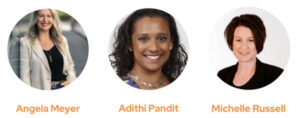The members of Global Women are change makers and leaders in a diverse variety of companies and organisations. They are recognised for their influence, impact and advocacy throughout Āotearoa New Zealand.
A positive outlook on leadership underpins their progress. As we mark the mid-way point of the year, we took this time to pause and reflect on the evolving nature of leadership.
Accordingly, we invited three Global Women leaders to share their leadership philosophies and insights.

Angela Meyer, who is based in Auckland, is the Founder of Double Denim, a marketing and communications firm, co-founder of the Ace Lady Network, Gender Justice Collective and Project Gender and serves on several boards. She practices leadership daily. When asked about the demanding requirements of leadership, especially in trying times, Angela responded:
“The different leadership roles I hold all require different approaches. I try to be the leader each person in each team needs. I feel a huge responsibility for the people I have the privilege of leading and I want them to know I have their back, always. It’s about trust. I work hard to make sure I have built the trust needed to move at pace. I also believe in surrounding myself with people far smarter than me.”
When Angela was asked about servant leadership and how it is a practice more aligned with iwi in New Zealand, she replied:
“Servant leadership style feels very natural to me. My parents instilled in us a belief that everyone has a part to play, that leadership takes many forms and that if you are not prepared to roll up your sleeves you shouldn’t expect anyone else to do that either. Diversity of thought and practice excites me. I love learning from others about alternative ways of doing things and ways of being a leader. I believe by being open, curious and positive we are in a powerful position to make our society more equal and inclusive.”
Adithi Pandit has been with Deloitte in Wellington for 12 years where she is a Consulting Partner. She leads the Strategy & Business Design practice, social innovation and impact services helping organizations transform their business through changes to people, process and technology. She thrives on solving “wicked problems.” When asked about her leadership strategy, Adithi’s answer isn’t surprising:
“Leadership can be hard, and it can be a source of joy, especially when we don’t make it about ourselves but about the shared purpose and enabling others to be their best. Leading our social impact practice involves learning and enriching my understanding, connecting with people on topics I care about, making choices about where we can have the most influence and effect change. Leadership is also about choice. You can’t have focus without making choices. Sometimes this is about saying no to things that seem really great, but you know there’s not enough capacity. And sometimes it’s about accepting that you can’t please everyone, and that’s okay. Learning to say no and doing it to be kind to yourself and your team is really critical.”
Michelle Russell also hails from Wellington. She is the General Manager of Talent & Culture for NZ and the Pacific at ANZ Bank New Zealand. Michelle has more than 16 years’ experience in the Finance industry, working as an HR professional across a number of jurisdictions, and influencing business leaders to think differently about their people, the skills they bring to their roles, and the cultures they are creating. So, what does leadership require to be effective and sustainable?
“An ability to lead through the grey and provide the necessary clarity or direction where there is none; the ability to flex and respond to change; agility and curiosity; an ability to be clear on priorities and communicating these effectively; and a lot of empathy.”
Michelle’s role requires investing in remote talent. Why is that important?
“Talent is important to us at ANZ as we build out our succession pipelines both in NZ and the Pacific and provide opportunities for our people to grow and develop. Hybrid working has brought us closer together than ever before so it’s been great to leverage Global Women’s Activate programme for our Pacific business. Activate is allowing our people in remote locations to participate, network and learn from like- minded individuals across a range of industries – which is an opportunity they may not have had historically.
We must listen, learn, and more importantly grow and develop Māori and Pasifika leaders so the workforce is more diverse and inclusive of difference.”
All interviews and stories written by our Editor in Residence, Jenni Prisk (Global Women Member)

